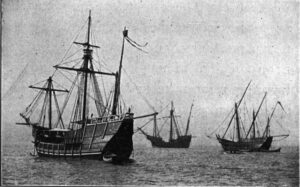The second Monday in October is annually observed as Columbus Day honoring the Italian explorer who landed in the New World 525 years ago. Although he made previous stops in the Caribbean before he arrived on a small island off the coast of Florida, his arrival on October 12, 1492 officially marks the European discovery of the Americas.
Because of his daring voyage, it is hard to overstate the influence this man has had on the entire world. As a result, the US designated a federal holiday in 1934 much to the delight of many schoolchildren, teachers, and government workers. Today there are numerous towns and cities named after this man and even a large South American country and many other nations also honor this explorer with their own holidays. 
I remember in elementary school learning about his firm conviction in a round earth and that one would not fall off the edge if he sailed too far. Although there were others who also espoused this concept, Columbus was brave enough to prove it. Perhaps his views were informed by the Biblical prophet Isaiah who spoke of God sitting above the circle of the earth.
Recently, however, Columbus has taken a beating by the politically correct establishment. Because he doesn’t match the ideal profile of many modernists, he has been thrown under the Colum-bus, but what was this man really like?
While suffering the same sinful condition of the rest of humanity, Christopher Columbus had many admirable qualities that we would do well to emulate. His bravery and willingness to risk his life as well as his reputation on what many considered a far-fetched idea expanded not only European boundaries, but also brought about much lasting good. Many atrocities followed his discovery, but we can no more hold those to his account than we can Hitler’s to his parents. When weighed on the balance of history, the benefits of Columbus’ discovery far outweigh the travesties.
Unlike the evil conqueror he has recently been portrayed as, Columbus was a steady man of great character and faith, which is likely the very reason he now draws such criticism. One of his primary motivations was not fame, riches, nor territory, but evangelism. He did not set out to harm and destroy the Native Americans, but to tell them of God’s great love. His goal was to bless these people, not hurt them.
About a month after his landing, he wrote the Spanish monarchs, “that if [the Indians] had access to devout religious persons knowing the language, they would all turn Christian, and so I hope in Our Lord that Your Highnesses will do something about it with much care, in order to turn to the Church so numerous a folk, and to convert them…”
After returning, he reported, “I gave them many beautiful and pleasing things, which I had brought with me, for no return whatever, in order to win their affection, and that they might become Christians…Let Christ rejoice upon Earth as he rejoices in Heaven, as he foresees that so many souls of so many people heretofore lost are to be saved…”
Columbus’ faith motivated him to attempt great things for His God. In his own words, he declared, “[O]ur Lord opened to my understanding (I could sense His hand upon me) so it became clear to me that [the voyage] was feasible. . . Who doubts that this illumination was from the Holy Spirit? I attest that He [the Holy Spirit], with marvelous rays of light, consoled me through the holy and sacred Scriptures . . . they inflame me with a sense of great urgency. . . . No one should be afraid to take on any enterprise in the name of our Savior if it is right and if the purpose is purely for His holy service. . . . And I say that the sign which convinces me that our Lord is hastening the end of the world is the preaching of the Gospel recently in so many lands.”
Yes, many abuses followed Columbus’ discovery but many abuses were already occurring here. The arrival of the gospel shone much light in the darkness and opened a mighty door for the advancement of Jesus’ Kingdom. May the faith and courage of Christopher Columbus inspire us today to share the gospel and to attempt great and mighty things for our God as well.
In Jesus, George